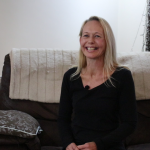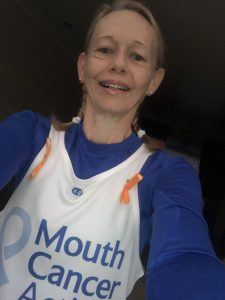“It’ll go away. It can’t be that serious”.
That’s what father of four Robert Powell told himself when he came down with a persistent sore throat.
It happened shortly after the London-born business consultant, along with his wife Susie, moved to France to open up a bed and breakfast.
Robert suffered with tonsilitis as a young child, so a sore throat was nothing out of the ordinary.
“In those days, they used to whip your tonsils out at the drop of a hat but despite having several bouts of tonsillitis, they left them in,” Robert says. “I just thought, I’ve got a sore throat and it’ll go away. I did the blokey thing and ignored it.”
It took Robert several months before accepting that he needed help. Coming back to the UK routinely for work, Robert visited a GP who prescribed him some antibiotics. When the medication did not ease the pain in the back of Robert’s mouth, he decided to seek the advice of a dentist.
Robert adds: “One day, I was doing training at a dental practice and said, ‘would you mind taking a look at this?’. The dentist put me in the chair, took one look before bringing in a colleague. They immediately said, ‘when you return to France, you need to see somebody urgently’.

“I went back later that week. Like the UK, the French health care system is very good. They were rapid. I made a call and went in for a consultation. The next day I was in a specialist unit for a biopsy and two days later I received the diagnosis that I had mouth cancer on my tonsils.
“This was my 62nd birthday. Quite the present.”
A human biology and immunology graduate from the University of London, Robert has spent much of his adult life working in healthcare.
Because of his work alongside dental practices, Robert was aware of mouth cancer, but it wasn’t that high up on his agenda. He did not smoke or drink an excessive amount of alcohol. Robert considered himself a fit and healthy person.
“When I was told that I had mouth cancer, I was in disbelief,” Robert says. “A feeling of denial that it can’t possibly happen to me. I lived healthily and didn’t think I was in a risk factor group. For a time, I detached myself from it all and convinced myself that it’s fine and nothing to worry about.
“The news effected the children more. We had the family over for the holidays and they were thinking is this going to be the last Christmas? It was that thought which made me think it was really serious.”
Thankfully, Robert’s cancer was caught early. He underwent a 12-week course of chemotherapy and radiotherapy and has since been able to make a good recovery.
However, the lasting impact of mouth cancer continues to be with him.
Robert adds: “I still suffer with a dry mouth, as the radiotherapy damaged my salvia glands.
“I also struggle a lot with taste… which for somebody who enjoys their food, living in France on wine and cheese for four years, that’s a big problem. If I eat a bar of Cadbury’s I can tell what it is for the first 30 seconds, but after that, it may as well be margarine. I also used to enjoy a vindaloo but now a korma seems hot.”
Due to Robert’s treatment, he also needs to wear a mouthguard filled with fluoride gel when he sleeps. He will need to do this for the next five years, to help strengthen his teeth and maintain good oral health – something that many mouth cancer survivors face difficulties with.
Robert has become a mouth cancer ambassador for the Oral Health Foundation, to share his experiences and raise awareness of the disease that has changed his life.
Spotting mouth cancer early is crucial for beating the disease and Robert urges everyone to be more aware of the changes that occur inside their mouth.
Robert says: “The lesson I took away is that even if you are a non-smoker, you are still at risk. You can’t sit there and be complacent and think this can’t happen to me. So many people like myself, will make the mistake of dismissing the symptoms and think they will go away.
“Mouth cancer can happen to anybody, however fit or normal you think you are. That’s why regular dental check-ups are so important. Having a specialist like a dentist look in your mouth routinely is as vital as cervical screening or a breast cancer check. Even if there’s nothing there, it’s the reassurance. Regular dental check-ups can be a matter of life or death.”
Mouth cancer can appear on the tonsils, tongue, gum, cheek, head and neck.
Be alert to mouth ulcers which do not heal within three weeks, red and white patches and unusual lumps or swellings. Persistent hoarseness, or a numbness on the lips or tongue are the other common signs. If you notice any of these symptoms, visits a dentist or doctor immediately.
You can find more information on mouth cancer by going to www.mouthcancer.org and by following November’s Mouth Cancer Action Month on social media via #MouthCancerAction.






 Speaking of her determination to remain mentally and physically healthy in the thick of her battle with cancer, Mrs Liesching-Schroder said: “I just needed to run. Control was being taken away from me by cancer and this was one way of getting control back. When it came to the end of radiotherapy, I had the goal that I wanted to run the Southend half-marathon. I was told by clinicians that I wouldn’t be allowed to do it. But nobody could stop me. It’s what’s keeping me going and I have to do this. Running was my way of being free from it all.”
Speaking of her determination to remain mentally and physically healthy in the thick of her battle with cancer, Mrs Liesching-Schroder said: “I just needed to run. Control was being taken away from me by cancer and this was one way of getting control back. When it came to the end of radiotherapy, I had the goal that I wanted to run the Southend half-marathon. I was told by clinicians that I wouldn’t be allowed to do it. But nobody could stop me. It’s what’s keeping me going and I have to do this. Running was my way of being free from it all.”

